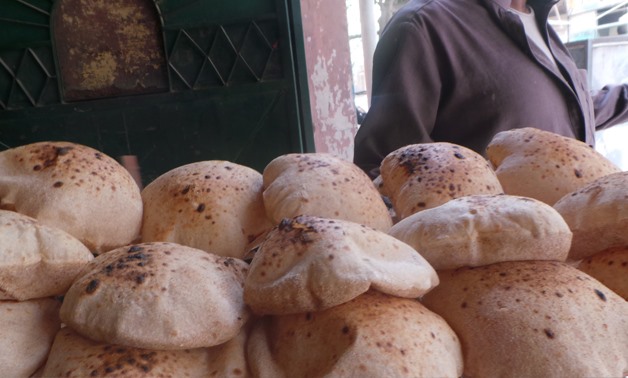
Egyptian subsidized bread in a governmental bakery in Helwan district, southern Cairo- May 9, 2018- Egypt Today- Samar Samir
CAIRO – 13 May 2018: Egypt is the largest wheat importer in the world, as the Ministry of Supply, via the General Authority for Supply Commodities (GASC), imports 11-12 million tons of wheat annually to meet the people’s demands of bread, the cheapest meal on tables for 94.8 million people.
Subsidized bread was one of Egyptians’ three main demands as expressed by the popular “Bread, Freedom, Democracy!” chant during the 2011 uprising that toppled former President Hosni Mubarak.
In an attempt to reduce the amount of imported wheat, which is used for bread, Ezzat Abdin, former head of the Food Technology Research Institute’s (FTRI) branch in Kafr el-Sheikh, has offered an alternative to bread.
In a governmental bakery in the governorate with the attendance of Kafr el-Sheikh Governor Al-Sayyed Nasr on Thursday, Abdin carried out an experiment to produce a loaf of bread from ingredients different from the current whole-meal flat bread. The new loaf contains 10 percent barley, 10-15 percent broken rice, 35 percent coarse wheat flour and 35 percent sweet potatoes.

Kafr el Sheikh governor witnesses the production of a new bread baked from sweet potato, barley, and broken rice- Egypt Today/Mohamed Suleiman.jpg
“Using 35 percent wheat could be gotten from domestic farmers and Egypt would not import wheat anymore,” Abdin told Egypt Today on Saturday, adding that in case the new experiment was implemented nationwide, it could save more than LE 20 billion ($1.13 billion) annually allocated for wheat imports, particularly as Egypt has an abundance of rice and sweet potatoes.
He continued that adopting this new experiment could decrease the cost of a loaf of bread by LE 0.12. The government bears LE 0.55, the actual cost of producing one loaf of bread, which is sold for LE 0.05. Since 1898, Egypt has fixed the subsided price at LE0.05 to reach the poor.
In the state’s general budget for 2018/2019, the government has allocated LE 60 billion for the whole system of subsidized bread, said Minister of Supply Ali Moselhy in remarks to media in March. As per the subsidy system, the government should produce more than 11.4 billion loaves of bread monthly for about 76.4 million people who are eligible for the bread subsidy.
As of July 2017, the government imported 12 million tons of wheat from Russia, Ukraine and Belarus via international tenders, according to the latest figures published by the U.N. Food and Agriculture Organization (FAO) in September 2017. The government also purchased 3.5 million tons from domestic farmers last year. Egypt’s annual consumption of wheat reaches 15 million tons.
Concerning the alternative ingredients, Egypt is the largest producer of sweet potatoes in Africa. In 2014, it produced 393,000 tons of sweet potatoes. As for rice, the country had been exporting broken rice for $227 million annually before an export ban was imposed since August 2016, said Ragab Shehata, head of rice section at the Chamber of Cereals Industry, in media remarks in August 2016. However, the country could be turned from a rice exporter to importer after the newly-passed agricultural law decreased the pieces of lands allocated for water-intensive crops due to Egypt’s water shortage.
Nutritional value
Abdin said that the new loaf is highly nutritious due to its varied ingredients, which contain both vegetable and cereal carbohydrates, adding that the new bread could be good for those who suffer from celiac disease.
Despite the fact that the experiment could be economically feasible, nutritionists have different points of view on the matter. Peter Maher Wahba, member of the Egyptian Arabic Society for Healthy and Therapeutic Nutrition (EASHTN), told Egypt Today that there are no alternatives or replacements to the value of wheat in the subsidized bread, which includes highly nutritious fibers.
“Wheat contains simple carbohydrates, which can be easily digested in the stomach... while other ingredients such as rice and potatoes have complex carbohydrates, which can easily form fats in the intestines and increase the rate of obesity in the Egyptian society,” Wahba added.
“A report on the new experiment will be submitted to the governor and other governmental officials to see if it could be applied,” Abdin said.


Comments
Leave a Comment